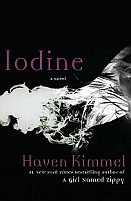Iodine
 by Haven Kimmel
by Haven Kimmel

Strange
detours on roads that might not exist
Through dream journals, brilliant
Midwestern student Trace Pennington records the terrors and thoughts of
a traumatized girl. A mixture of third person and first person
narration tells the story of her classes in Special Topics in
Archetypal Psychology and the remaining class on the Wounded Women she
needs to complete a minor in Women's Studies. Interwoven within and
against these narratives, the reader also hears stories of living in a
shack without electricity, her dog Weeds as well as mythological dogs,
her friendship with Candy and UFO abduction. Literary and psychological
theory itself becomes an essential part of the plot as the psychosis
itself is explored through academic concepts.
Clearly, IODINE is a book
that will not appeal to all readers, especially readers looking for a
more traditional narrative with a linear plot, clear characterization
and a realistic tone. The plot is not distinguishable from the dream
narratives. As a narrator, Trace is unreliable to the n-th decree. She
readily admits lying and the reader questions the truth of every word
by the end. Truth or outside events are not clearly distinguishable
from the inner events of psychosis. The veracity of one school of
psychology or literary theory is not guaranteed. At every turn the
reader readjusts their interpretive framework. Feminism, Structuralism,
Semiotics, Psychoanalytic, Deconstruction, Reader Response theory and
even New Criticism enter the fray as avenues through which to enter the
IODINE narrative
and yet none provide the answer or unlock the text or the personal
psychosis. Haven Kimmel's description of the Women's Studies class
details a humorous and not so humorous look into the interaction
between the personal and the intellectual within academia. Here there
are no tags of realism as described by Todorov, or if there are, they
quickly vanish as the narrative itself takes strange detours on roads
that do not exist. The reader keeps looking for a route, a key with
which to decipher the text into a logical construct --- but Haven
Kimmal does not provide the easy answer.
IODINE is a
poetic, cutting edge book that blazes a new, dark territory. All
safeguards are gone in this text which takes academic notions, a
classical prose narrative style and indeed the inner mind and turns
them not just on the head but also removes the ground. IODINE is clearly not a book to
choose if you want to relax into a more traditional reading experience.
The publisher's description of the book provides an interpretive key
perhaps to sort out the truth or plot, but in reading the book, even
those words seem to be inadequate to describe the contents of IODINE. Are those words reliable or
just one more interpretive framework to be discredited? For readers
versed in the world of literary or psychological theory, Haven Kimmel's
IODINE delights.
The narrative twists and turns in plot, symbol, voice and just about
every other narrative device in its portrait of Trace and her
psychosis, provoking a desire for analysis while simultaneously
destroying the sanctity or primacy of each route. IODINE is not an easy read that
will appeal to a mass readership and yet, this reader loves the
challenge and lack of safe interpretive formula. Its portrait of
psychosis in character and in literature itself is ahead of its time
and, as fiction, most certainly a fascinating challenge to the current
state of literary theory.
Publisher: Free Press (August 2008)
Reviewed by Merrimon,
Merrimon Book Reviews
Review Courtesy of Amazon Vine
